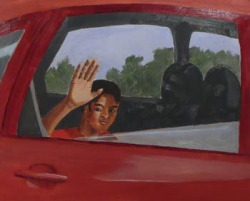As our solid title here implies, alliteration aside of course, I'd like to talk to you first and foremost about 'faith', and more importantly how the governing faith of our society, Christianity, Is inherently bonded to fiction. If anyone should find themselves offended at my implication that Christianity is the governing faith of American society I present you with this revelation. English, your language, in itself is an extremely lucrative example of the omnipresent Christian overtones ingrained in our culture. What I aim to persuade you of is that fiction, deserves just as much a right to capitalization as Christianity does.
Exhibit A. The bible. In my opinion and in the opinion of any self respecting admirer of literature, the bible is a decent representation of fiction. It has compelling characters, thought provoking situations, clever literary devices, In essence it presents to us situations that we can learn from. What any good author should aim to do with fiction is to create for an audience, a sense that what they are telling them is true. The character does exist, or could plausibly exist within the parameters the author has laid out for them. The events that shape the characters could reasonably happen to someone. The life of Christ could, within the parameters the bible has deemed 'reasonable', have been factual. So what Christ becomes essentially, is Romeo. Bare with me here. Christ, in the setting he is best known for, is nothing more than a character within a story, who is relevant because he sets forth an ideal. A standard. A moral objectivity to which people might strive to emulate. Romeo himself behaves in a way that humanity deems commendable, with honor, undying love, eventually sacrifice. Yet no large group of people will gather to mourn his passing.
Exhibit B. Fiction itself. As a driving force of culture. Human beings do not naturally act on their own without some model to follow. An infant behaves as it's parents behave. As we get older we find models for life in literature. We identify with characters and through the characters struggles we learn how we might like to act. The bible presented humanity with lovable characters who acted in the most logically compelling ways for their time. We let it get far out of hand though. We mutated what was a valuable art for into some disgusting rule book. Fiction has the ability to change throughout history. When monarchy's stretched across most of the world fiction was entirely different than the democratically charged trend we find ourselves in today. The bible however has been desecrated, not of its own fault but by the fault of humanity. We needed it to be something it should not have been. A rule book. Where it should have stayed a work of fiction.
I'm straying from my point here. All I want for you to take from these ramblings is that we should give credit where credit is due. Our culture has built an entire faith on fiction. Maybe It's time we widened the realm of characters we draw direction from.
Exhibit A. The bible. In my opinion and in the opinion of any self respecting admirer of literature, the bible is a decent representation of fiction. It has compelling characters, thought provoking situations, clever literary devices, In essence it presents to us situations that we can learn from. What any good author should aim to do with fiction is to create for an audience, a sense that what they are telling them is true. The character does exist, or could plausibly exist within the parameters the author has laid out for them. The events that shape the characters could reasonably happen to someone. The life of Christ could, within the parameters the bible has deemed 'reasonable', have been factual. So what Christ becomes essentially, is Romeo. Bare with me here. Christ, in the setting he is best known for, is nothing more than a character within a story, who is relevant because he sets forth an ideal. A standard. A moral objectivity to which people might strive to emulate. Romeo himself behaves in a way that humanity deems commendable, with honor, undying love, eventually sacrifice. Yet no large group of people will gather to mourn his passing.
Exhibit B. Fiction itself. As a driving force of culture. Human beings do not naturally act on their own without some model to follow. An infant behaves as it's parents behave. As we get older we find models for life in literature. We identify with characters and through the characters struggles we learn how we might like to act. The bible presented humanity with lovable characters who acted in the most logically compelling ways for their time. We let it get far out of hand though. We mutated what was a valuable art for into some disgusting rule book. Fiction has the ability to change throughout history. When monarchy's stretched across most of the world fiction was entirely different than the democratically charged trend we find ourselves in today. The bible however has been desecrated, not of its own fault but by the fault of humanity. We needed it to be something it should not have been. A rule book. Where it should have stayed a work of fiction.
I'm straying from my point here. All I want for you to take from these ramblings is that we should give credit where credit is due. Our culture has built an entire faith on fiction. Maybe It's time we widened the realm of characters we draw direction from.
